OSCE human rights office presents 2012 death penalty report

September 26, 2012 in Warsaw (Poland) held the annual meeting of the Organization for Security and Cooperation in Europe (OSCE) on human rights.
During the conference of the OSCE Office for Democratic Institutions and Human Rights (ODIHR) has presented this year's background paper on the death penalty in the OSCE region.
Among developments covered in this year’s paper was Latvia’s ratification of Protocol 13 to the European Convention on Human Rights, by which Latvia abolished the use of the death penalty in all cases, OSCE says.
The report, presented at the OSCE Human Dimension Implementation Meeting, notes that this brings the number of the 56 OSCE participating States that have now completely abolished the death penalty to 51.
Three participating States - Kazakhstan, the Russian Federation and Tajikistan - retain the death penalty in law but with moratoria on executions.
Belarus and the United States remain the only countries in the OSCE area that still carry out executions.
In the United States, Connecticut abolished capital punishment and became the 18th jurisdiction without the death penalty, while the governor of Oregon declared a moratorium on executions for the duration of his tenure.
OSCE commitments do not require participating States to abolish capital punishment. However, participating States have committed themselves to using the death penalty as punishment only for the most serious crimes and in a manner not contrary to their international commitments, as well as to keeping the elimination of capital punishment under consideration.
-
03.01
-
07.10
-
22.09
-
17.08
-
12.08
-
30.09










































